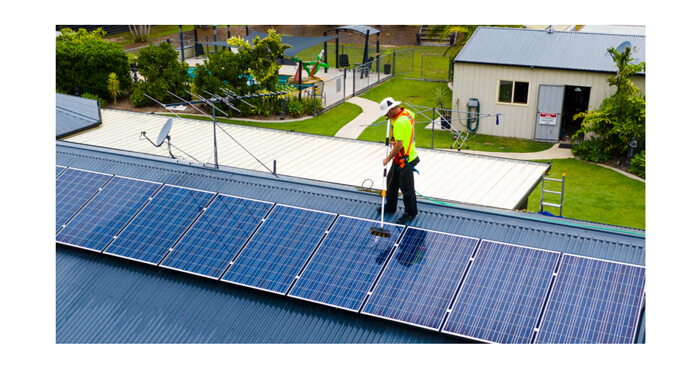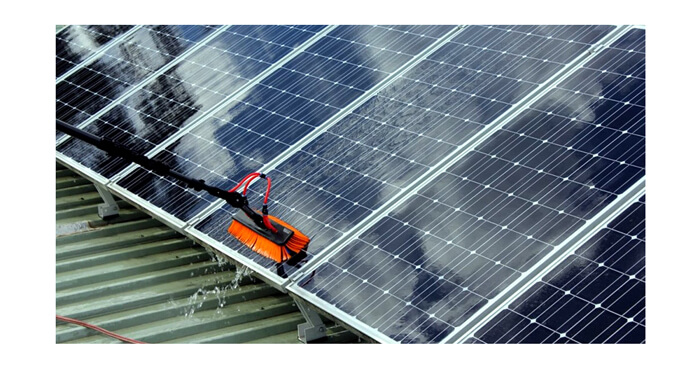Contents:
Solar panels are a significant investment and keeping them clean is essential to maximizing their efficiency. Dirt, dust, pollen, and bird droppings can accumulate on the panels over time, reducing their ability to capture sunlight effectively. Here’s a step-by-step guide to help you clean your solar panels safely and effectively.

Why Cleaning Solar Panels is Important
Solar panels rely on sunlight to generate electricity. When dirt and debris cover the panel’s surface, they block sunlight and reduce energy production. Regular cleaning can improve the efficiency of your solar power system by up to 20%. Additionally, clean panels have a longer lifespan, which protects your investment in renewable energy.
When to Clean Solar Panels
The best times to clean solar panels are early in the morning or late in the evening when the panels are cool. Cleaning panels in direct sunlight or when they are hot can cause water to evaporate too quickly, leaving residue on the surface. If you live in a dusty or rainy area, monitor your panels regularly and clean them as needed.
Tools Needed for Cleaning Solar Panels
Here is a list of recommended tools for cleaning solar panels:
-
Soft-Bristle Brush: To gently remove dirt and debris.
-
Garden Hose with Spray Nozzle: To rinse panels without using excessive pressure.
-
Bucket with Mild Detergent: Use a biodegradable soap to avoid leaving chemical residues.
-
Squeegee or Microfiber Cloth: For drying the panel surfaces after cleaning.
Step-by-Step Guide to Clean Solar Panels
-
Turn Off the System
For safety, always switch off the solar system before starting any cleaning work.
-
Rinse with Water
Start by rinsing the panels with a gentle stream of water to remove loose dirt and dust. Avoid using high-pressure water as it may damage the panels.
-
Apply Soapy Water
Fill a bucket with water and add a small amount of biodegradable soap. Dip the soft-bristle brush or sponge into the soapy water and gently scrub the panels.
-
Remove Stubborn Debris
For tougher stains, such as bird droppings, allow the soapy water to soak for a few minutes. Then gently scrub with the brush until the residue is gone.
-
Rinse Again
After scrubbing, rinse the panels with clean water to wash away any remaining soap or dirt.
-
Dry the Panels
Use a squeegee or microfiber cloth to dry the panels. This step helps prevent water spots from forming, especially in areas with hard water.
Cleaning Tips and Precautions
-
Avoid Abrasive Cleaners: Do not use harsh chemicals, abrasives, or metal brushes, as they can damage the surface of the panels.
-
Use Safety Gear: If your panels are on a roof, use proper safety equipment and follow roof safety guidelines.
-
Clean Regularly but Carefully: Check your panels regularly, but only clean them when necessary. Over-cleaning can lead to scratches or other surface damage.
Solar Panel Cleaning Checklist
|
Task
|
Description
|
Recommended Frequency
|
|
System Shutdown
|
Turn off the solar system before cleaning.
|
Every cleaning
|
|
Initial Rinse
|
Rinse with a garden hose to remove loose dirt.
|
Every cleaning
|
|
Apply Soapy Water
|
Use mild soap and a soft-bristle brush.
|
As needed
|
|
Rinse Again
|
Rinse with clean water to remove soap residue.
|
Every cleaning
|
|
Dry Panels
|
Use a squeegee or microfiber cloth to prevent water spots.
|
Every cleaning
|
Common Mistakes to Avoid
To ensure you’re cleaning solar panels safely and effectively, here are some mistakes to avoid:
-
Using Pressure Washers: While it might be tempting, high-pressure water can damage the panel's surface and even compromise the seals. Stick to low-pressure water to avoid these risks.
-
Cleaning During Hot Weather: Cleaning solar panels during hot weather can cause water to evaporate too quickly, leaving residue and creating streaks. Early morning or late evening is best, as temperatures are cooler, and any dew can help soften grime.
-
Skipping Safety Precautions: When working on roofs, always use safety gear, such as harnesses and non-slip shoes, to avoid accidents.
-
Using Harsh Chemicals: Chemicals can corrode the surface of your solar panels or cause gradual wear and tear. Stick to mild, eco-friendly soaps.
How Weather and Location Affect Cleaning Frequency
The need to clean your solar panels varies based on several factors:
-
Dusty or Polluted Areas: In locations with heavy dust or air pollution, such as near factories or highways, panels will need more frequent cleaning.
-
Near Agricultural Fields: In agricultural areas, dust and pollen are often higher, necessitating more regular maintenance.
-
Rainfall: In regions with frequent rain, natural cleaning occurs, which may reduce the need for manual cleaning. However, rain alone might not be sufficient in areas with heavy pollen or dust, as these can turn into a sticky residue when mixed with water.
-
Coastal Regions: Salt deposits can accumulate on panels in coastal areas, requiring regular cleaning to avoid corrosion and maintain optimal performance.
Maintaining a Cleaning Schedule
Establishing a consistent cleaning schedule can help extend the life of your solar panels and keep them running at maximum efficiency. In areas with high dust or pollution, a quarterly cleaning schedule might be ideal. In low-dust areas, twice a year could be enough. Keep a maintenance log to monitor the cleaning frequency and effectiveness, especially if you notice a drop in energy production, as it might indicate the need for cleaning.
Monitoring Panel Performance
Regularly monitoring the output of your solar panels is an easy way to determine when they may need cleaning. Many solar systems come with monitoring apps that let you track daily, weekly, and monthly energy production. If you notice a sudden drop in production on a sunny day, check if dirt or debris might be the cause. Prompt cleaning can restore performance and prevent longer-term issues.

Advanced Cleaning Techniques
For those with larger solar installations or in areas with persistent dirt issues, additional cleaning options might be worth exploring:
-
Automated Cleaning Systems: Some companies offer robotic cleaning solutions designed specifically for solar panels. These systems use minimal water and operate automatically, making them ideal for large commercial installations where manual cleaning is impractical.
-
Electrostatic or Hydrophobic Coatings: Applying a special coating to solar panels can help repel dust and water, reducing the frequency of cleaning. These coatings are particularly beneficial in desert regions where dust and sand are major issues.
-
Deionized Water Systems: Deionized water is highly effective for cleaning because it lacks minerals that cause spots. When sprayed on panels, it removes residue without leaving streaks, making it ideal for achieving a spotless, streak-free finish.
Benefits of Regular Cleaning
Regularly maintaining solar panels has several long-term benefits:
-
Enhanced Energy Production: Clean solar panels can increase energy production by up to 20%, meaning you get the most out of your investment.
-
Extended Panel Lifespan: Dirt and grime can create hot spots on panels, which may lead to premature wear. Keeping them clean helps ensure they operate at their full potential over their lifespan.
-
Reduced Maintenance Costs: Dirty panels can lead to inefficiencies, which may result in more frequent repairs or replacements. Regular cleaning reduces the chances of malfunctions and costly service calls.
Monitoring the Efficiency of Cleaning Efforts
It’s essential to monitor energy output after each cleaning to evaluate its effectiveness. This helps identify the most efficient cleaning methods and frequency for your specific setup. If you observe a significant increase in energy production following cleaning, this reinforces the importance of regular maintenance. Over time, you’ll be able to fine-tune the cleaning schedule to balance cost, time, and efficiency.
Tips for Long-Term Maintenance
In addition to cleaning, here are other steps you can take for solar panel longevity:
-
Check for Shade: Regularly inspect surrounding trees or buildings that might be casting new shadows on the panels. Even partial shading can significantly impact performance.
-
Inspect for Physical Damage: Strong winds, hail, or falling branches can occasionally crack or damage panels. Conduct visual inspections for cracks, scratches, or other physical wear.
-
Professional Inspections: Schedule an annual inspection with a solar professional. They can detect issues like wiring problems or inverter faults that may go unnoticed during cleaning.
By implementing these cleaning and maintenance practices, you’ll ensure your solar panels remain effective, efficient, and well-protected for years to come. This routine not only optimizes energy output but also enhances the sustainability of your investment in renewable energy.
FAQs







